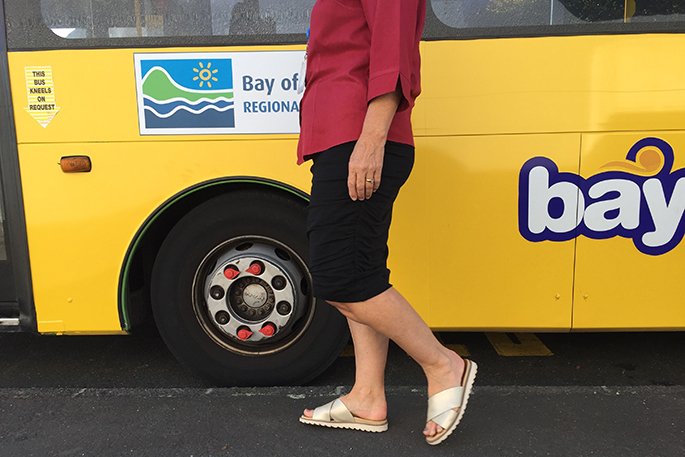I walked to work this week – 19 minutes door-to-door – just because Martin Parkes suggested indirectly that I should.
I walked to work a second morning, again at Martin Parkes' insistence. This time I took a longer route down Dive Crescent. The sun had daubed the Papamoa Hills with a red wash, a rowing coach was barking at a crew out on the darkened tide and the smell of roasted Kenyan coffee beans wafted down the street.
All of which made this walking to work lark quite therapeutic, almost spiritual. I had avoided the daily battle for the free carparks, I had avoided the tangle on Chapel Street. I was at ease. But more significantly, I contributed to Martin's grand plan.
'Do not consider yourself a small cog in a massive machine,” Martin told me. 'Everyone can make a difference to the transport network performs. Everyone can make a difference by considering when they travel, and how they travel.”
So my walking to work was a personal contribution to helping Martin lead us out of the mess – the traffic jams, the car clutter, the pressure on the CBD parking stocks, a city's growing pains.
'Get on a bike or walk one or two days a week,” he says. 'You don't have to do it every day. Then perhaps car pool or ride a bus. Try these things out.”
If just ten per cent of us try something different, then we would make the transport network perform a lot better than it currently is.
Martin Parkes has an unenviable job – he's Tauranga City Council's transportation manager. As he describes it, he deals with the emotive things. He manages parking, congestion and safety and makes the tough and often unpopular decisions.
Last week in The Weekend Sun, he reminded car commuters that parking in the CBD will never be the same. We probably won't be able to park outside work all day for free, there will be controls on where we park and for how long, and we will have to do something we don't like – we might have to pay to park. It's about managing finite resource.
The city centre is still very car dominated, but it's definitely changing according to the transportation manager.
Durham Street is being upgraded, 'and that has a real people focus,” says Martin. The council are looking at Elizabeth Street and Wharf Street, with ‘Eat Street' set to be developed into an even more pedestrian environment.
'So certainly the council has a different focus on what it wants the city centre to look and feel like. We want the focus to move away from cars to people walking and people cycling.”
And Martin Parkes is leading the way. He doesn't enjoy a company car and parking privileges. He rides to and from work each day on his E-bike.
'I keep having this conversation – it's not cheating, it's one less car on the road. That's how we all need to look at it.”
In the morning it takes him 16 or 17 minutes to cycle from the Rosedale subdivision in Ohauiti to his office on the corner of Cameron Road and 3rd Avenue, and perhaps about 20 minutes to get home.
'It's great,” he says. 'It clears the head, cruising home past all the traffic.” One of Martin's neighbours does the same trip in a car. It take him 45 minutes to get home.
Martin is not alone. 'We have cycle counters across the city and we've seen a huge uptake in cycling.”
But the message coming back to council from cyclists and would-be cyclists is the infrastructure isn't good enough. While on the other hand, motorists say cyclists help pay for that infrastructure.
'There's two points there,” says Martin. 'Bikes do much less damage to infrastructure than cars, so the need for more roads and the cost of maintenance on existing ones would go down. That is pressure off the ratepayers.”
Point two is that cyclists are actually motorists as well. They do have cars, so they are paying their way now.
Martin Parkes doesn't have to look too far beyond his own desk for an example of a workplace embracing alternative means of transport. 'There's 650 staff at TCC and more than half travel to work by alternative means. Half aren't travelling to work by car.”
The bike rack around the corner at the TCC is chocka. Now they're trying to spread the message beyond TCC's front door. 'We are engaging with businesses that are helping with their own staff travel plans.
'The buy in needs to come from the top. There needs to be incentives and end of trip facilities, such as bike storage, lockers and showers.”
And of course, there are the health benefits. A lot of the people in the adult cycling programme delivered across the city have enjoyed huge health benefits.
'People are dropping weight, they're coming off medication, they're socialising, making friends, enjoying work more and performing better.”
Martin Parkes still accepts that most people will want to drive to work. 'We have to accept that as a city, it'll be the dominant mode of transport in the years to come.”
But motorists will also have to accept a few things – there will be less free parking, and they will need to be up at sparrows to score it, otherwise they will have to pay.
So the message is that everyone can make a difference. 'We are all in this together,” he says 'We are all part of the problem and we are all part of the solution.
'I will be walking to work again tomorrow. I am one of the self-righteous enlightened ones now, and I am one more car off the road.”

